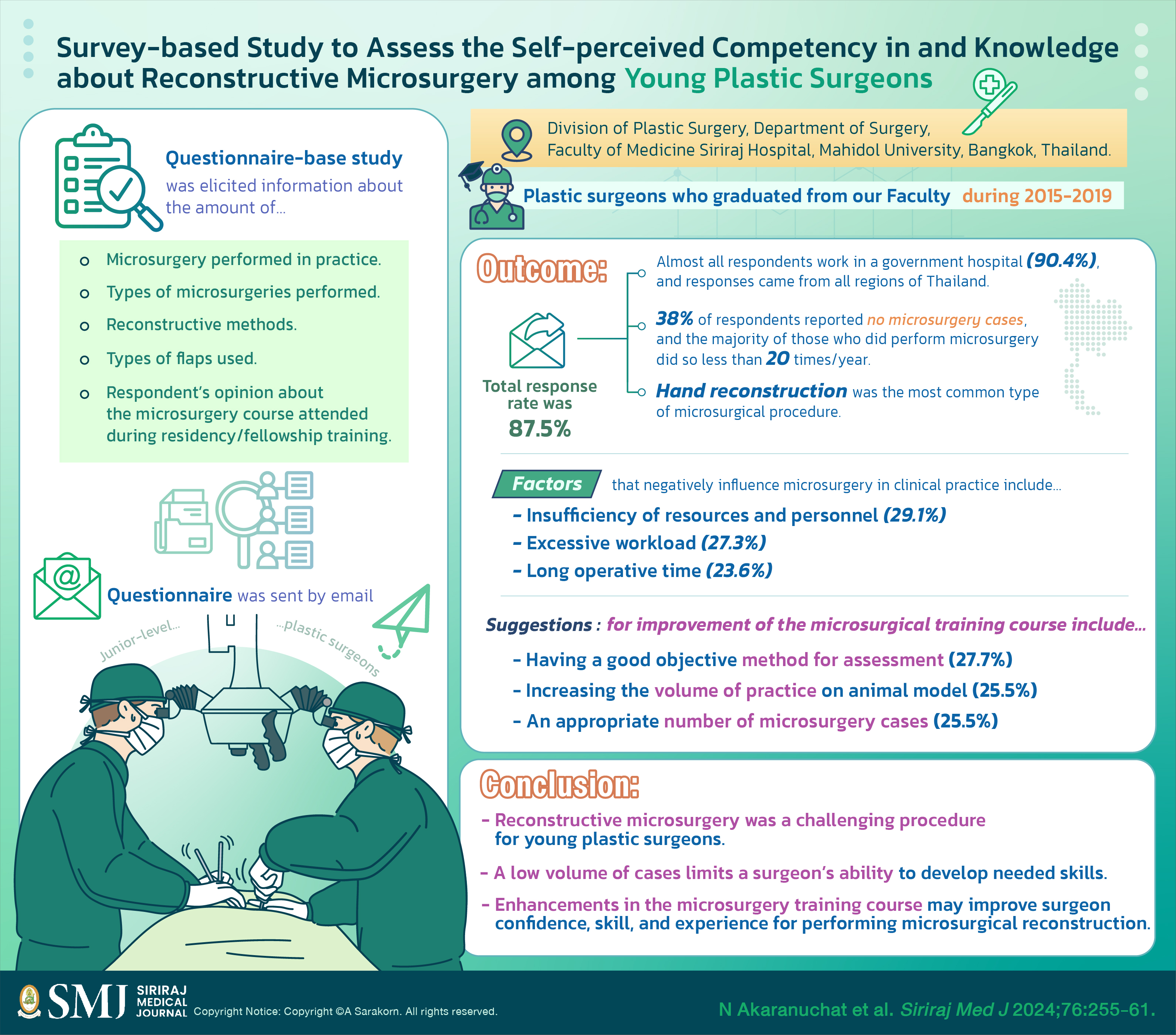Survey-based Study to Assess the Self-perceived Competency in and Knowledge about Reconstructive Microsurgery among Young Plastic Surgeons
DOI:
https://doi.org/10.33192/smj.v76i5.266240Keywords:
Microsurgery, Surgical Education, Free Flap, Plastic Surgery Training, Plastic SurgeonAbstract
Objective: Microvascular free tissue transfer has become a preferred reconstructive technique for managing complex wounds and defects. The aim of this questionnaire-based study was to assess self-perceived competency in and knowledge about reconstructive microsurgery among plastic surgeons who graduated from the Faculty of Medicine Siriraj Hospital, Mahidol University during 2015-2019.
Materials and Methods: Questionnaire was sent by email elicited information about the amount of microsurgery performed in practice, types of microsurgeries performed, reconstructive methods, types of flaps used, and respondent’s opinion about the microsurgery course attended during residency/fellowship training.
Results: The total response rate was 87.5%. Almost all respondents work in a government hospital (90.4%), and responses came from all regions of Thailand. Thirty-eight percent of respondents reported no microsurgery cases, and the majority of those who did perform microsurgery did so less than 20 times/year. Hand reconstruction was the most common type of microsurgical procedure. The factors that negatively influence microsurgery in clinical practice include insufficiency of resources and personnel (29.1%), excessive workload (27.3%), and long operative time (23.6%). Suggestions for improvement of the microsurgical training course include having a good objective method for assessing microsurgical practices (27.7%), increasing the volume of practice on animal model (25.5%), and an appropriate number of microsurgery cases to gain necessary experience (25.5%).
Conclusion: Reconstructive microsurgery was found to be a challenging procedure for many junior-level plastic surgeons. A low volume of cases limits a surgeon’s ability to develop needed skills. Important improvements in the microsurgery training course were also recommended.
References
Avraham T, Clavin N, Mehrara BJ. Microsurgical breast reconstruction. Cancer J. 2008;14(4):241-7.
Heller L, Levin LS. Lower extremity microsurgical reconstruction. Plast Reconstr Surg. 2001;108(4):1029-41.
Wong CH, Wei FC. Microsurgical free flap in head and neck reconstruction. Head Neck. 2010;32(9):1236-45.
Moon SJ, Hong JP, Kang SR, Suh HS. Survey of reconstructive microsurgery training in Korea. J Reconstr Microsurg. 2015;31(1):54-8.
Akaranuchat N. Lower Extremity Reconstruction with Vascularized Free-Tissue Transfer: 20 Years of Experience in the Faculty of Medicine Siriraj Hospital, Mahidol University, Bangkok, Thailand. Siriraj Med J. 2021;73(7):462-70.
Atkins JL, Kalu PU, Lannon DA, Green CJ, Butler PE. Training in microsurgical skills: Does course-based learning deliver? Microsurgery. 2005;25(6):481-5.
Brosious JP, Tsuda ST, Menezes JM, Baynosa RC, Stephenson LL, Mohsin AG, et al. Objective evaluation of skill acquisition in novice microsurgeons. J Reconstr Microsurg. 2012;28(8):539-42.
Gould SH. The role of the microsurgical laboratory in orthopedic training programs. Orthopedics. 1986;9(6):881-2.
Nugent E, Joyce C, Perez-Abadia G, Frank J, Sauerbier M, Neary P, et al. Factors influencing microsurgical skill acquisition during a dedicated training course. Microsurgery. 2012;32(8):649-56.
Akaranuchat N. Factors Associated with Improved Microsurgical Learning in a Plastic Surgery Training Program. J Med Assoc Thai. 2020;103:51-4.
Pomahac B, Bueno EM, Sisk GC, Pribaz JJ. Current principles of facial allotransplantation: the Brigham and Women's Hospital Experience. Plast Reconstr Surg. 2013;131(5):1069-76.
Pratt GF, Rozen WM, Chubb D, Whitaker IS, Grinsell D, Ashton MW, et al. Modern adjuncts and technologies in microsurgery: an historical and evidence-based review. Microsurgery. 2010;30(8):657-66.
Wang WZ. Investigation of reperfusion injury and ischemic preconditioning in microsurgery. Microsurgery. 2009;29(1):72-9.

Published
How to Cite
License
Copyright (c) 2024 Siriraj Medical Journal

This work is licensed under a Creative Commons Attribution-NonCommercial-NoDerivatives 4.0 International License.
Authors who publish with this journal agree to the following conditions:
Copyright Transfer
In submitting a manuscript, the authors acknowledge that the work will become the copyrighted property of Siriraj Medical Journal upon publication.
License
Articles are licensed under a Creative Commons Attribution-NonCommercial-NoDerivatives 4.0 International License (CC BY-NC-ND 4.0). This license allows for the sharing of the work for non-commercial purposes with proper attribution to the authors and the journal. However, it does not permit modifications or the creation of derivative works.
Sharing and Access
Authors are encouraged to share their article on their personal or institutional websites and through other non-commercial platforms. Doing so can increase readership and citations.














